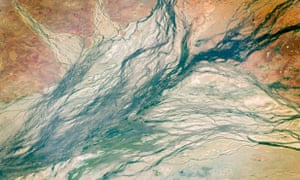Extract from The Guardian
Exclusive: applications to explore Kati Thanda-Lake Eyre basin submitted by energy company last July but previously unreported
The energy company Origin wants to search for fossil fuels across 225,000 hectares of the Kati Thanda-Lake Eyre basin in Queensland’s channel country – part of one of the world’s biggest free-flowing river systems.
The company is waiting to hear if the Queensland government will grant the applications for 10 petroleum leases, which were submitted in July last year but have not been previously reported.
The 10 blocks – covering an area about the size of the ACT – are to the east and south-east of the tiny outback town of Windorah.
Several blocks straddle Cooper Creek, with one block neighbouring Lake Yamma Yamma – a nationally important wetland.
Campaigners are concerned Origin could be planning to target unconventional gas resources in the area, potentially using hydraulic fracturing and multiple drill sites.
Asked what was planned for the leases, the company said only that it would target “any potential hydrocarbons” if its applications were successful.
Last year it was revealed an independent report commissioned in 2019 by the Queensland government, but not made public, had called for a ban on unconventional gas exploration in the region.
The government is now consulting stakeholders and traditional owners to develop a new set of regulations covering the basin area.
Oil and gas production has taken place in the basin since the late 1960s. A 2020 federal government assessment of the Cooper basin shows existing gasfields to the south and east of Origin’s applications.
Carmel Flint, national co-ordinator for the Lock the Gate Alliance campaign group, said the energy industry was focused on developing unconventional shale gas locked up in sedimentary rock in the area.
She said the Queensland government had previously committed to protect the area, in particular from unconventional gas exploration, which required more gas wells than conventional gas production.
“We want to see a moratorium on all unconventional gas drilling and activities on the floodplains of the basin while the government works out the long term process to look after these areas,” Flint said.
“They should not be handing out petroleum leases whilst they are undertaking consultation to protect these areas.”
Prof Richard Kingsford, director of the Centre for Ecosystem Science at the University of NSW, has been researching the floodplains of Cooper Creek for two decades.
He said the Cooper Creek floodplain could bulge as wide as 80km during flood in the area of the leases.
He said the basin was an “incredibly complex” system of ephemeral rivers and lakes that can go from isolated pools and dried-up channels during dry periods to rivers many kilometres wide during floods, unleashing an explosion of birds, plant and insect life.
“That incredible complexity gives it incredible fragility. It’s recognised as one of the world’s last big free-flowing rivers,” he said.
“The spectre of potential exploration and development on sensitive floodplain could have major environmental impacts in stopping water from going to where it’s used to going.”
He said the floodplain downstream from Windorah, in the area covered by Origin’s applications, was particularly important.
“It’s extraordinary by any scale,” he said. During floods the region becomes a magnet for wading birds, including migratory species from the northern hemisphere.
Because the region was so flat, Kingsford said, the water moved slowly, “and any obstructions can change the course of the river”.
In October the state’s deputy premier, Steven Miles, wrote to environmental campaigners at Lock the Gate Alliance promising protections for the Lake Eyre basin, which includes Cooper Creek.
He said the Palaszczuk government had made a commitment in December 2019 “to ensure the protection of streams and floodplains in the Queensland section of the Lake Eyre basin by returning the protections that existed in the Wild Rivers framework”.
The 2019 independent report, which was leaked and later tabled in parliament, recommended that gas wells and ponds be excluded from areas which frequently flood, and unconventional petroleum and gas production should be designated “unacceptable use” in an area that overlaps with some of the Origin lease applications.
Origin is among a number of high-profile businesses to support independent MP Zali Steggal’s climate change legislation that includes a target for Australia’s greenhouse gas emissions to to reach net zero by 2050.
A spokesman for Origin said in a statement the company was the majority holder of the petroleum lease applications, which he said had been made by a smaller company, Blue Energy.
The spokesman said: “They are yet to be granted by the Queensland government, along with any regulatory conditions and work commitments.
“Origin would adopt all regulations and put in place approved management plans, procedures and controls to protect the environment.”
A statement from Queensland’s Department of Resources said the applications for the petroleum leases were “under consideration” but there was “no prescribed timeframe by which any decisions must be made”.
The Department of Environment and Science said in a statement it “remains committed to working with First Nations peoples, industry, local councils, stakeholders and communities to ensure the sustainable management of the Lake Eyre basin”.
Consultation to develop a new framework to cover the region was postponed in February 2020 due to the Covid-19 pandemic, the statement said, but this would “recommence soon”.
.png)

No comments:
Post a Comment